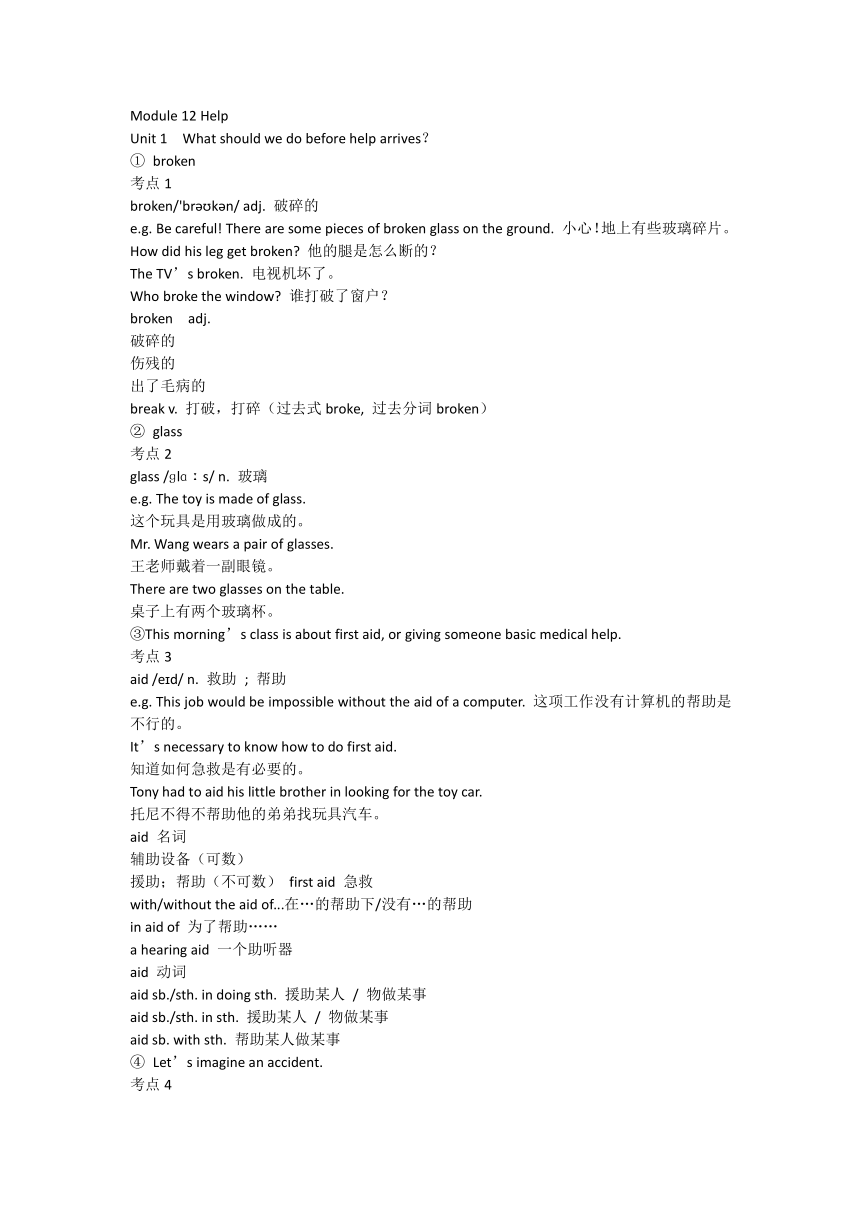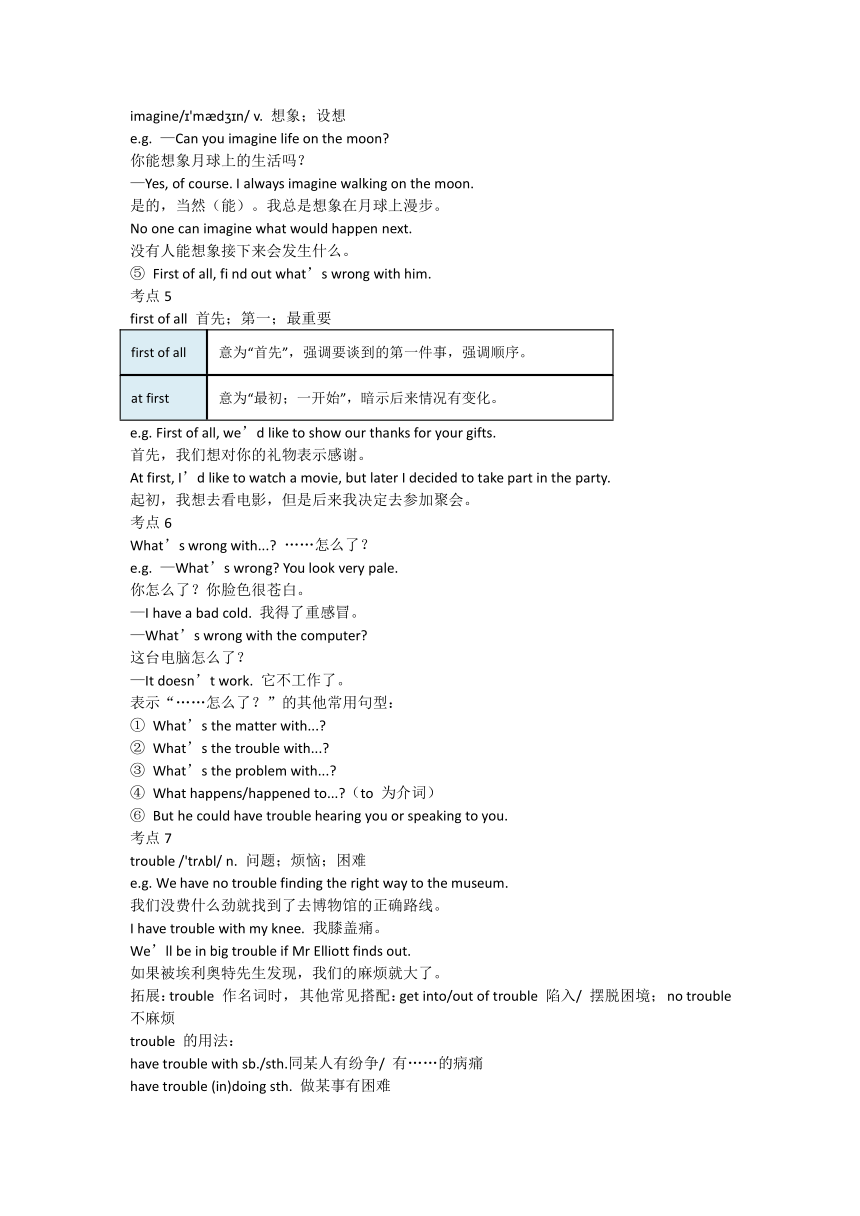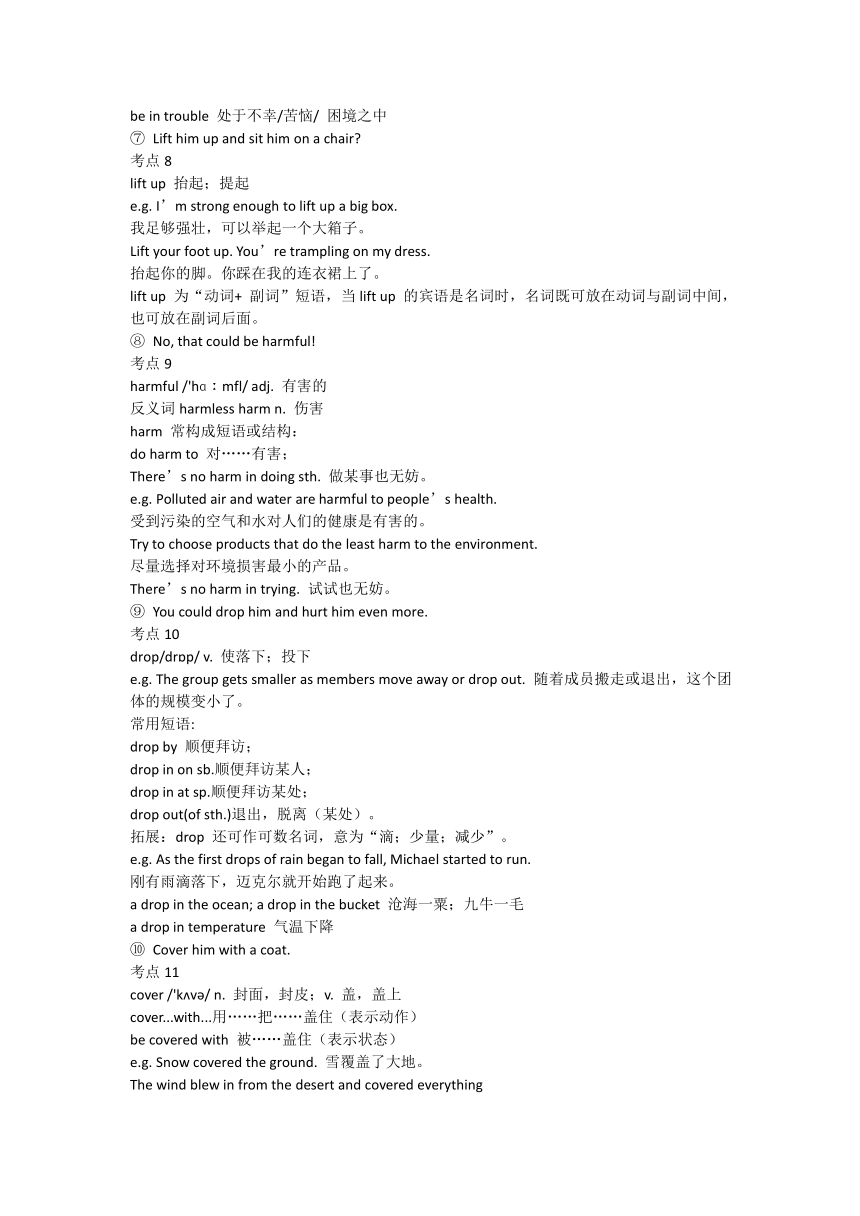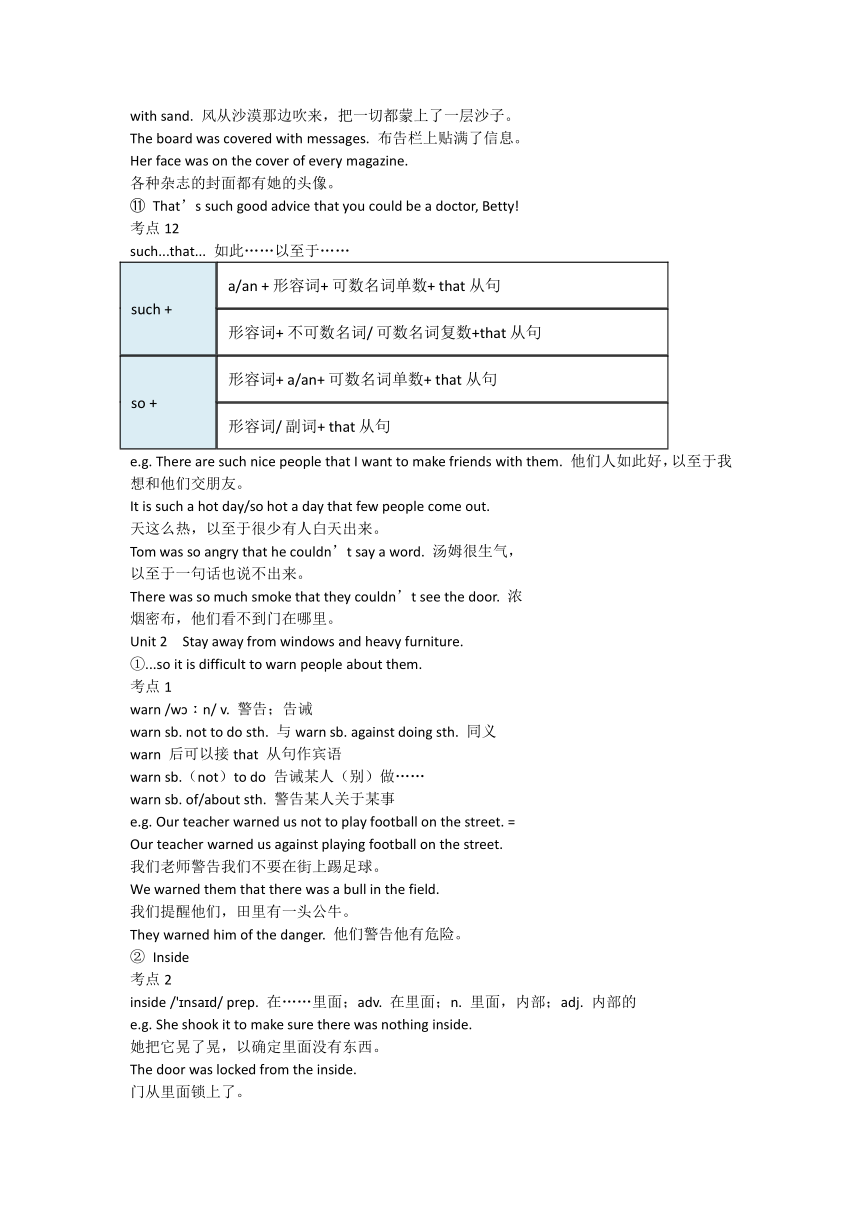Module 12 Help 知识点讲义
文档属性
| 名称 | Module 12 Help 知识点讲义 |

|
|
| 格式 | docx | ||
| 文件大小 | 433.9KB | ||
| 资源类型 | 教案 | ||
| 版本资源 | 外研版 | ||
| 科目 | 英语 | ||
| 更新时间 | 2023-09-09 07:11:13 | ||
图片预览




文档简介
Module 12 Help
Unit 1 What should we do before help arrives?
① broken
考点1
broken/'br k n/ adj. 破碎的
e.g. Be careful! There are some pieces of broken glass on the ground. 小心!地上有些玻璃碎片。
How did his leg get broken 他的腿是怎么断的?
The TV’s broken. 电视机坏了。
Who broke the window 谁打破了窗户?
broken adj.
破碎的
伤残的
出了毛病的
break v. 打破,打碎(过去式broke, 过去分词broken)
② glass
考点2
glass /ɡlɑ s/ n. 玻璃
e.g. The toy is made of glass.
这个玩具是用玻璃做成的。
Mr. Wang wears a pair of glasses.
王老师戴着一副眼镜。
There are two glasses on the table.
桌子上有两个玻璃杯。
③This morning’s class is about first aid, or giving someone basic medical help.
考点3
aid /e d/ n. 救助 ; 帮助
e.g. This job would be impossible without the aid of a computer. 这项工作没有计算机的帮助是不行的。
It’s necessary to know how to do first aid.
知道如何急救是有必要的。
Tony had to aid his little brother in looking for the toy car.
托尼不得不帮助他的弟弟找玩具汽车。
aid 名词
辅助设备(可数)
援助;帮助(不可数) first aid 急救
with/without the aid of...在…的帮助下/没有…的帮助
in aid of 为了帮助……
a hearing aid 一个助听器
aid 动词
aid sb./sth. in doing sth. 援助某人 / 物做某事
aid sb./sth. in sth. 援助某人 / 物做某事
aid sb. with sth. 帮助某人做某事
④ Let’s imagine an accident.
考点4
imagine/ 'm d n/ v. 想象;设想
e.g. —Can you imagine life on the moon
你能想象月球上的生活吗?
—Yes, of course. I always imagine walking on the moon.
是的,当然(能)。我总是想象在月球上漫步。
No one can imagine what would happen next.
没有人能想象接下来会发生什么。
⑤ First of all, fi nd out what’s wrong with him.
考点5
first of all 首先;第一;最重要
first of all 意为“首先”,强调要谈到的第一件事,强调顺序。
at first 意为“最初;一开始”,暗示后来情况有变化。
e.g. First of all, we’d like to show our thanks for your gifts.
首先,我们想对你的礼物表示感谢。
At first, I’d like to watch a movie, but later I decided to take part in the party.
起初,我想去看电影,但是后来我决定去参加聚会。
考点6
What’s wrong with... ……怎么了?
e.g. —What’s wrong You look very pale.
你怎么了?你脸色很苍白。
—I have a bad cold. 我得了重感冒。
—What’s wrong with the computer
这台电脑怎么了?
—It doesn’t work. 它不工作了。
表示“……怎么了?”的其他常用句型:
① What’s the matter with...
② What’s the trouble with...
③ What’s the problem with...
④ What happens/happened to... (to 为介词)
⑥ But he could have trouble hearing you or speaking to you.
考点7
trouble /'tr bl/ n. 问题;烦恼;困难
e.g. We have no trouble finding the right way to the museum.
我们没费什么劲就找到了去博物馆的正确路线。
I have trouble with my knee. 我膝盖痛。
We’ll be in big trouble if Mr Elliott finds out.
如果被埃利奥特先生发现,我们的麻烦就大了。
拓展:trouble 作名词时, 其他常见搭配:get into/out of trouble 陷入/ 摆脱困境; no trouble 不麻烦
trouble 的用法:
have trouble with sb./sth.同某人有纷争/ 有……的病痛
have trouble (in)doing sth. 做某事有困难
be in trouble 处于不幸/苦恼/ 困境之中
⑦ Lift him up and sit him on a chair
考点8
lift up 抬起;提起
e.g. I’m strong enough to lift up a big box.
我足够强壮,可以举起一个大箱子。
Lift your foot up. You’re trampling on my dress.
抬起你的脚。你踩在我的连衣裙上了。
lift up 为“动词+ 副词”短语,当lift up 的宾语是名词时,名词既可放在动词与副词中间,也可放在副词后面。
⑧ No, that could be harmful!
考点9
harmful /'hɑ mfl/ adj. 有害的
反义词harmless harm n. 伤害
harm 常构成短语或结构:
do harm to 对……有害;
There’s no harm in doing sth. 做某事也无妨。
e.g. Polluted air and water are harmful to people’s health.
受到污染的空气和水对人们的健康是有害的。
Try to choose products that do the least harm to the environment.
尽量选择对环境损害最小的产品。
There’s no harm in trying. 试试也无妨。
⑨ You could drop him and hurt him even more.
考点10
drop/dr p/ v. 使落下;投下
e.g. The group gets smaller as members move away or drop out. 随着成员搬走或退出,这个团体的规模变小了。
常用短语:
drop by 顺便拜访;
drop in on sb.顺便拜访某人;
drop in at sp.顺便拜访某处;
drop out(of sth.)退出,脱离(某处)。
拓展:drop 还可作可数名词,意为“滴;少量;减少”。
e.g. As the first drops of rain began to fall, Michael started to run.
刚有雨滴落下,迈克尔就开始跑了起来。
a drop in the ocean; a drop in the bucket 沧海一粟;九牛一毛
a drop in temperature 气温下降
⑩ Cover him with a coat.
考点11
cover /'k v / n. 封面,封皮;v. 盖,盖上
cover...with...用……把……盖住(表示动作)
be covered with 被……盖住(表示状态)
e.g. Snow covered the ground. 雪覆盖了大地。
The wind blew in from the desert and covered everything
with sand. 风从沙漠那边吹来,把一切都蒙上了一层沙子。
The board was covered with messages. 布告栏上贴满了信息。
Her face was on the cover of every magazine.
各种杂志的封面都有她的头像。
That’s such good advice that you could be a doctor, Betty!
考点12
such...that... 如此……以至于……
such + a/an + 形容词+ 可数名词单数+ that 从句
形容词+ 不可数名词/ 可数名词复数+that 从句
so + 形容词+ a/an+ 可数名词单数+ that 从句
形容词/ 副词+ that 从句
e.g. There are such nice people that I want to make friends with them. 他们人如此好,以至于我想和他们交朋友。
It is such a hot day/so hot a day that few people come out.
天这么热,以至于很少有人白天出来。
Tom was so angry that he couldn’t say a word. 汤姆很生气,
以至于一句话也说不出来。
There was so much smoke that they couldn’t see the door. 浓
烟密布,他们看不到门在哪里。
Unit 2 Stay away from windows and heavy furniture.
①...so it is difficult to warn people about them.
考点1
warn /w n/ v. 警告;告诫
warn sb. not to do sth. 与warn sb. against doing sth. 同义
warn 后可以接that 从句作宾语
warn sb.(not)to do 告诫某人(别)做……
warn sb. of/about sth. 警告某人关于某事
e.g. Our teacher warned us not to play football on the street. =
Our teacher warned us against playing football on the street.
我们老师警告我们不要在街上踢足球。
We warned them that there was a bull in the field.
我们提醒他们,田里有一头公牛。
They warned him of the danger. 他们警告他有危险。
② Inside
考点2
inside /' nsa d/ prep. 在……里面;adv. 在里面;n. 里面,内部;adj. 内部的
e.g. She shook it to make sure there was nothing inside.
她把它晃了晃,以确定里面没有东西。
The door was locked from the inside.
门从里面锁上了。
John, you’d better wait for me inside the office.
约翰,你最好在办公室里等我。
I was driving on the inside lane.
我当时驾车在慢车道上行驶。
③ Hide under a table.
考点3
under/' nd / prep. 在……正下方,在……下面
below 与 under 均可表示数量方面的“少于”,under 更常用。
e.g. He can’t be much below/under sixty.
他的年龄不可能比 60 岁小很多。
表示温度“零度以下”要用 below zero。
④ Stay away from windows and heavy furniture.
考点4
stay away from... 远离……
同义短语:keep away from...
away from 意为 “从……离开,相距”,常与具体数词或动词连用。
e.g. Stay away from the dog. It may bite you.
离那狗远点。它可能会咬你。
The bus station is two kilometers away from here.
公交车站距离这里两公里。
The mother pulled the child away from the fi re just in time.
母亲正好及时把孩子从火旁拉开。
⑤ Keep clear of fires.
考点5
keep clear of... 避开;不和……接触
e.g. Keep clear of the door of the elevator.
不要靠近电梯的门。
I cleared my desk of papers.
我清理好了写字台上的文件。
Clear all those papers off the table.
把桌子上所有那些文件都拿走。
clear 的其他常见用法:
形容词
a clear day 晴朗的一天
clear water 清澈的水
动词
clear the table 收拾桌子
The haze clears. 雾霾散去。
clear sth. of sth. 清理某物上的某物
clear sth. from/off sth. 把某物从某物上清理下来
⑥ Keep calm, especially when you are with other people.
考点6
keep /ki p/ v. 保持,留在 keep 后可接形容词作表语
keep 的其他常见结构:
keep sb./sth.+adj. /adv. / 介词短语
使某人/ 某物保持某种状态
keep sb./sth. doing sth. 使某人/ 某物一直做某事
keep (on) doing sth. 继续/ 一直做某事
keep sb./sth. from doing sth. 阻止某人/ 某物做某事
e.g. You must look after yourself and keep healthy.
你一定要照顾自己,保持身体健康。
Please keep your hands behind your back. 请把手放在背后。
Don’t keep them working day and night.
不要让他们不分白天黑夜来工作。
The old woman keeps on standing there still.
那个老太太一直站在那里,一动也不动。
The church bells keep me from sleeping.
教堂的钟声使我不能入睡。
考点7
calm/kɑ m/ adj. 镇静的;沉着的
e.g. He answered with a calm voice.
他以平静的声音回答。
He took a few deep breaths to calm himself down.
他深深地吸了几口气,使自己平静下来。
⑦ Be brave and be helpful.
考点8
brave/bre v/ adj. 勇敢的
e.g. It was brave of you to speak in front of all those people.
你很勇敢,能在那么多人面前说话。
考点9
helpful/'helpfl/ adj. 有用的;有帮助的; 愿意帮忙的
e.g. It is helpful to discuss your problems with your friends.
和你的朋友商量你的问题是有帮助的。
She’s a helpful child. 她是个乐于助人的孩子。
⑧ In the mountains, be careful of falling rocks.
考点10
be careful of... 小心……
be careful with
小心(对待)……
be careful (not) to do sth. 小心(不要)做某事
e.g. Be careful! Don’t break the new camera.
小心!不要摔坏了这个新相机。
Be careful of the traffic. 注意交通安全。
Tony, be careful with your things.
托尼,小心保管你的东西。
Be careful not to go out alone at night, Kate.
凯特,小心不要夜里单独外出。
⑨ In short, follow what you learnt in school.
考点11
in short 总之
=in a word
be short of 缺少 for short 简称 be short for 是……的缩写
e.g. In short, this book is excellent. It’s worth reading.
总之,这本书很好,值得一看。
“Telephone” is called “phone” for short.
Telephone 简称为 phone。
It’s terrible for us to be short of water.
没有水对我们来说是可怕的。
BYD is short for “build your dreams”.
比亚迪(BYD)是“塑造梦想”(build your dreams) 的缩写。
Unit 3Language in use
① in pain
考点1
in pain 在痛苦中
e.g. I’m wounded and in pain. 我受伤了,而且很疼。
in 表示“处于……” 状态中
in safety 在安全中;
in need 在危难中;
in trouble 在困境中;
in peace 安静地;
in danger 在危险中。
② My father called for help on his mobile phone.
考点2
call for 要求;需要
e.g. Your plan will call for a lot of money.
你的计划会需要许多钱。
call sb. up 给某人打电话
call out 大声叫唤
③ Tilly’s teacher was very proud of her.
考点3
be proud of 为……感到骄傲
be proud of= take pride in;
be proud 后面还可以接to be 或that从句。
e.g. He was proud of himself for not giving up.
=He took pride in himself for not giving up.
他为自己没有放弃而感到自豪。
I feel very proud to be a member of the team.
能成为这个队中的一员我感到十分自豪。
She was proud that her daughter had so many talents.
她为女儿有这么多才能而自豪。
祈使句肯定句式的四种类型
祈使句和情态动词must, can, could 表示推测考点1
祈使句
祈使句的否定形式
祈使句的反意疑问句
考向4
祈使句的回答
祈使句通常表示将要发生的动作,所以回答时一般借助于will 或won’t。
回答肯定形式的祈使句 Yes, I/we will.
回答否定形式的祈使句 Sorry, I/we won’t.
e.g. —Please remember to bring your homework here tomorrow.
请记得明天把你的家庭作业带到这里。
—Yes, I will. 好的,我会的。
—Don’t throw rubbish in the park!
不要在公园里扔垃圾!
—Sorry, I won’t. 对不起,我不会了。
考点2
must, can, could 表推测
从句式上理解情态动词表推测的用法。表示推测时,肯定句中用must,can,could,may,might; 否定句中用can’t 或couldn’t,may not 或might not;疑问句中用can 或 could。
考向2
从可能性上理解情态动词表推测的用法。情态动词must,can,could,may,might 表示推测时,其中must 表示的可能性程度最大,表示“必然”。can,could,may,might 都表示“可能”,其中might 表示的可能性程度最小。
Unit 1 What should we do before help arrives?
① broken
考点1
broken/'br k n/ adj. 破碎的
e.g. Be careful! There are some pieces of broken glass on the ground. 小心!地上有些玻璃碎片。
How did his leg get broken 他的腿是怎么断的?
The TV’s broken. 电视机坏了。
Who broke the window 谁打破了窗户?
broken adj.
破碎的
伤残的
出了毛病的
break v. 打破,打碎(过去式broke, 过去分词broken)
② glass
考点2
glass /ɡlɑ s/ n. 玻璃
e.g. The toy is made of glass.
这个玩具是用玻璃做成的。
Mr. Wang wears a pair of glasses.
王老师戴着一副眼镜。
There are two glasses on the table.
桌子上有两个玻璃杯。
③This morning’s class is about first aid, or giving someone basic medical help.
考点3
aid /e d/ n. 救助 ; 帮助
e.g. This job would be impossible without the aid of a computer. 这项工作没有计算机的帮助是不行的。
It’s necessary to know how to do first aid.
知道如何急救是有必要的。
Tony had to aid his little brother in looking for the toy car.
托尼不得不帮助他的弟弟找玩具汽车。
aid 名词
辅助设备(可数)
援助;帮助(不可数) first aid 急救
with/without the aid of...在…的帮助下/没有…的帮助
in aid of 为了帮助……
a hearing aid 一个助听器
aid 动词
aid sb./sth. in doing sth. 援助某人 / 物做某事
aid sb./sth. in sth. 援助某人 / 物做某事
aid sb. with sth. 帮助某人做某事
④ Let’s imagine an accident.
考点4
imagine/ 'm d n/ v. 想象;设想
e.g. —Can you imagine life on the moon
你能想象月球上的生活吗?
—Yes, of course. I always imagine walking on the moon.
是的,当然(能)。我总是想象在月球上漫步。
No one can imagine what would happen next.
没有人能想象接下来会发生什么。
⑤ First of all, fi nd out what’s wrong with him.
考点5
first of all 首先;第一;最重要
first of all 意为“首先”,强调要谈到的第一件事,强调顺序。
at first 意为“最初;一开始”,暗示后来情况有变化。
e.g. First of all, we’d like to show our thanks for your gifts.
首先,我们想对你的礼物表示感谢。
At first, I’d like to watch a movie, but later I decided to take part in the party.
起初,我想去看电影,但是后来我决定去参加聚会。
考点6
What’s wrong with... ……怎么了?
e.g. —What’s wrong You look very pale.
你怎么了?你脸色很苍白。
—I have a bad cold. 我得了重感冒。
—What’s wrong with the computer
这台电脑怎么了?
—It doesn’t work. 它不工作了。
表示“……怎么了?”的其他常用句型:
① What’s the matter with...
② What’s the trouble with...
③ What’s the problem with...
④ What happens/happened to... (to 为介词)
⑥ But he could have trouble hearing you or speaking to you.
考点7
trouble /'tr bl/ n. 问题;烦恼;困难
e.g. We have no trouble finding the right way to the museum.
我们没费什么劲就找到了去博物馆的正确路线。
I have trouble with my knee. 我膝盖痛。
We’ll be in big trouble if Mr Elliott finds out.
如果被埃利奥特先生发现,我们的麻烦就大了。
拓展:trouble 作名词时, 其他常见搭配:get into/out of trouble 陷入/ 摆脱困境; no trouble 不麻烦
trouble 的用法:
have trouble with sb./sth.同某人有纷争/ 有……的病痛
have trouble (in)doing sth. 做某事有困难
be in trouble 处于不幸/苦恼/ 困境之中
⑦ Lift him up and sit him on a chair
考点8
lift up 抬起;提起
e.g. I’m strong enough to lift up a big box.
我足够强壮,可以举起一个大箱子。
Lift your foot up. You’re trampling on my dress.
抬起你的脚。你踩在我的连衣裙上了。
lift up 为“动词+ 副词”短语,当lift up 的宾语是名词时,名词既可放在动词与副词中间,也可放在副词后面。
⑧ No, that could be harmful!
考点9
harmful /'hɑ mfl/ adj. 有害的
反义词harmless harm n. 伤害
harm 常构成短语或结构:
do harm to 对……有害;
There’s no harm in doing sth. 做某事也无妨。
e.g. Polluted air and water are harmful to people’s health.
受到污染的空气和水对人们的健康是有害的。
Try to choose products that do the least harm to the environment.
尽量选择对环境损害最小的产品。
There’s no harm in trying. 试试也无妨。
⑨ You could drop him and hurt him even more.
考点10
drop/dr p/ v. 使落下;投下
e.g. The group gets smaller as members move away or drop out. 随着成员搬走或退出,这个团体的规模变小了。
常用短语:
drop by 顺便拜访;
drop in on sb.顺便拜访某人;
drop in at sp.顺便拜访某处;
drop out(of sth.)退出,脱离(某处)。
拓展:drop 还可作可数名词,意为“滴;少量;减少”。
e.g. As the first drops of rain began to fall, Michael started to run.
刚有雨滴落下,迈克尔就开始跑了起来。
a drop in the ocean; a drop in the bucket 沧海一粟;九牛一毛
a drop in temperature 气温下降
⑩ Cover him with a coat.
考点11
cover /'k v / n. 封面,封皮;v. 盖,盖上
cover...with...用……把……盖住(表示动作)
be covered with 被……盖住(表示状态)
e.g. Snow covered the ground. 雪覆盖了大地。
The wind blew in from the desert and covered everything
with sand. 风从沙漠那边吹来,把一切都蒙上了一层沙子。
The board was covered with messages. 布告栏上贴满了信息。
Her face was on the cover of every magazine.
各种杂志的封面都有她的头像。
That’s such good advice that you could be a doctor, Betty!
考点12
such...that... 如此……以至于……
such + a/an + 形容词+ 可数名词单数+ that 从句
形容词+ 不可数名词/ 可数名词复数+that 从句
so + 形容词+ a/an+ 可数名词单数+ that 从句
形容词/ 副词+ that 从句
e.g. There are such nice people that I want to make friends with them. 他们人如此好,以至于我想和他们交朋友。
It is such a hot day/so hot a day that few people come out.
天这么热,以至于很少有人白天出来。
Tom was so angry that he couldn’t say a word. 汤姆很生气,
以至于一句话也说不出来。
There was so much smoke that they couldn’t see the door. 浓
烟密布,他们看不到门在哪里。
Unit 2 Stay away from windows and heavy furniture.
①...so it is difficult to warn people about them.
考点1
warn /w n/ v. 警告;告诫
warn sb. not to do sth. 与warn sb. against doing sth. 同义
warn 后可以接that 从句作宾语
warn sb.(not)to do 告诫某人(别)做……
warn sb. of/about sth. 警告某人关于某事
e.g. Our teacher warned us not to play football on the street. =
Our teacher warned us against playing football on the street.
我们老师警告我们不要在街上踢足球。
We warned them that there was a bull in the field.
我们提醒他们,田里有一头公牛。
They warned him of the danger. 他们警告他有危险。
② Inside
考点2
inside /' nsa d/ prep. 在……里面;adv. 在里面;n. 里面,内部;adj. 内部的
e.g. She shook it to make sure there was nothing inside.
她把它晃了晃,以确定里面没有东西。
The door was locked from the inside.
门从里面锁上了。
John, you’d better wait for me inside the office.
约翰,你最好在办公室里等我。
I was driving on the inside lane.
我当时驾车在慢车道上行驶。
③ Hide under a table.
考点3
under/' nd / prep. 在……正下方,在……下面
below 与 under 均可表示数量方面的“少于”,under 更常用。
e.g. He can’t be much below/under sixty.
他的年龄不可能比 60 岁小很多。
表示温度“零度以下”要用 below zero。
④ Stay away from windows and heavy furniture.
考点4
stay away from... 远离……
同义短语:keep away from...
away from 意为 “从……离开,相距”,常与具体数词或动词连用。
e.g. Stay away from the dog. It may bite you.
离那狗远点。它可能会咬你。
The bus station is two kilometers away from here.
公交车站距离这里两公里。
The mother pulled the child away from the fi re just in time.
母亲正好及时把孩子从火旁拉开。
⑤ Keep clear of fires.
考点5
keep clear of... 避开;不和……接触
e.g. Keep clear of the door of the elevator.
不要靠近电梯的门。
I cleared my desk of papers.
我清理好了写字台上的文件。
Clear all those papers off the table.
把桌子上所有那些文件都拿走。
clear 的其他常见用法:
形容词
a clear day 晴朗的一天
clear water 清澈的水
动词
clear the table 收拾桌子
The haze clears. 雾霾散去。
clear sth. of sth. 清理某物上的某物
clear sth. from/off sth. 把某物从某物上清理下来
⑥ Keep calm, especially when you are with other people.
考点6
keep /ki p/ v. 保持,留在 keep 后可接形容词作表语
keep 的其他常见结构:
keep sb./sth.+adj. /adv. / 介词短语
使某人/ 某物保持某种状态
keep sb./sth. doing sth. 使某人/ 某物一直做某事
keep (on) doing sth. 继续/ 一直做某事
keep sb./sth. from doing sth. 阻止某人/ 某物做某事
e.g. You must look after yourself and keep healthy.
你一定要照顾自己,保持身体健康。
Please keep your hands behind your back. 请把手放在背后。
Don’t keep them working day and night.
不要让他们不分白天黑夜来工作。
The old woman keeps on standing there still.
那个老太太一直站在那里,一动也不动。
The church bells keep me from sleeping.
教堂的钟声使我不能入睡。
考点7
calm/kɑ m/ adj. 镇静的;沉着的
e.g. He answered with a calm voice.
他以平静的声音回答。
He took a few deep breaths to calm himself down.
他深深地吸了几口气,使自己平静下来。
⑦ Be brave and be helpful.
考点8
brave/bre v/ adj. 勇敢的
e.g. It was brave of you to speak in front of all those people.
你很勇敢,能在那么多人面前说话。
考点9
helpful/'helpfl/ adj. 有用的;有帮助的; 愿意帮忙的
e.g. It is helpful to discuss your problems with your friends.
和你的朋友商量你的问题是有帮助的。
She’s a helpful child. 她是个乐于助人的孩子。
⑧ In the mountains, be careful of falling rocks.
考点10
be careful of... 小心……
be careful with
小心(对待)……
be careful (not) to do sth. 小心(不要)做某事
e.g. Be careful! Don’t break the new camera.
小心!不要摔坏了这个新相机。
Be careful of the traffic. 注意交通安全。
Tony, be careful with your things.
托尼,小心保管你的东西。
Be careful not to go out alone at night, Kate.
凯特,小心不要夜里单独外出。
⑨ In short, follow what you learnt in school.
考点11
in short 总之
=in a word
be short of 缺少 for short 简称 be short for 是……的缩写
e.g. In short, this book is excellent. It’s worth reading.
总之,这本书很好,值得一看。
“Telephone” is called “phone” for short.
Telephone 简称为 phone。
It’s terrible for us to be short of water.
没有水对我们来说是可怕的。
BYD is short for “build your dreams”.
比亚迪(BYD)是“塑造梦想”(build your dreams) 的缩写。
Unit 3Language in use
① in pain
考点1
in pain 在痛苦中
e.g. I’m wounded and in pain. 我受伤了,而且很疼。
in 表示“处于……” 状态中
in safety 在安全中;
in need 在危难中;
in trouble 在困境中;
in peace 安静地;
in danger 在危险中。
② My father called for help on his mobile phone.
考点2
call for 要求;需要
e.g. Your plan will call for a lot of money.
你的计划会需要许多钱。
call sb. up 给某人打电话
call out 大声叫唤
③ Tilly’s teacher was very proud of her.
考点3
be proud of 为……感到骄傲
be proud of= take pride in;
be proud 后面还可以接to be 或that从句。
e.g. He was proud of himself for not giving up.
=He took pride in himself for not giving up.
他为自己没有放弃而感到自豪。
I feel very proud to be a member of the team.
能成为这个队中的一员我感到十分自豪。
She was proud that her daughter had so many talents.
她为女儿有这么多才能而自豪。
祈使句肯定句式的四种类型
祈使句和情态动词must, can, could 表示推测考点1
祈使句
祈使句的否定形式
祈使句的反意疑问句
考向4
祈使句的回答
祈使句通常表示将要发生的动作,所以回答时一般借助于will 或won’t。
回答肯定形式的祈使句 Yes, I/we will.
回答否定形式的祈使句 Sorry, I/we won’t.
e.g. —Please remember to bring your homework here tomorrow.
请记得明天把你的家庭作业带到这里。
—Yes, I will. 好的,我会的。
—Don’t throw rubbish in the park!
不要在公园里扔垃圾!
—Sorry, I won’t. 对不起,我不会了。
考点2
must, can, could 表推测
从句式上理解情态动词表推测的用法。表示推测时,肯定句中用must,can,could,may,might; 否定句中用can’t 或couldn’t,may not 或might not;疑问句中用can 或 could。
考向2
从可能性上理解情态动词表推测的用法。情态动词must,can,could,may,might 表示推测时,其中must 表示的可能性程度最大,表示“必然”。can,could,may,might 都表示“可能”,其中might 表示的可能性程度最小。
同课章节目录
- Module 1 How to learn English
- Unit 1 Let's try to speak English as much as possi
- Unit 2 You should smile at her.
- Unit 3 Language in use .
- Module 2 My home town and my country
- Unit 1 It's taller than many other buildings.
- Unit 2 Cambridge is a beautiful city in the east o
- Unit 3 Language in use .
- Module 3 Sports.
- Unit 1 Nothing is more exciting than playing tenni
- Unit 2 This year we training more carefully.
- Unit 3 Language in use .
- Module 4 Planes, ships and trains .
- Unit 1 He lives the farthest from school.
- Unit 2 What is the best way to travel.
- Unit 3 Language in use .
- Module 5 Lao She Teahouse.
- Unit 1 I wanted to see the Beijing Opera.
- Unit 2 It descibes the changes in Chinese society.
- Unit 3 Language in use .
- Module 6 Animals in danger.
- Unit 1 It allows people to get closer to them .
- Unit 2 The WWF is working hard to save them all.
- Unit 3 Language in use .
- Revision module A
- Module 7 A famous story
- Unit 1 Alice was sitting with her sister by the ri
- Unit 2 She was thinking about her cat.
- Unit 3 Language in use .
- Module 8 Accidents
- Unit 1 While the car were changing to red, a car s
- Unit 2 I was trying to pick it up when it bite me
- Unit 3 Language in use .
- Module 9 Population
- Unit 1 The population of China is about 1.37 billi
- Unit 2 Arnwick was a city with 200,000 people.
- Unit 3 Language in use .
- Module 10 The weathe
- Unit 1 It might snow.
- Unit 2 The weather is fine all year round.
- Unit 3 Language in use .
- Module 11 Way of life
- Unit 1 In China ,we open a gift later.
- Unit 2 In England, you usually drink tea with milk
- Unit 3 Language in use .
- Module 12 Help
- Unit 1 What should we do before help arrives?
- Unit 2 Stay away from windows and heavy furniture.
- Unit 3 Language in use .
- Revision module B
